Ceylon IDE M3.2 released
Gavin, Sjur and Tomáš have been hard at work all summer to deliver a much-improved version of the Ceylon IDE. This release support exactly the same language constructs and features the same JVM backend compiler as the M3.1 release, so it's 100% compatible with it. But while the backend is the same, the UI is much improved, as you can see from the following change log and screen shots.
No more dependence on IMP
We recommend removing IMP from your Eclipse installation.
Ceylon Explorer view
The Ceylon Explorer View presents packages as children of the containing modules. You should reset your Ceylon Perspective after updating the IDE on order to get the Ceylon Explorer in place of JDT's Package Explorer.

Awesome documentation hover
Hover over the name of a Ceylon or Java declaration to see the gorgeous new hover info. Click in it to browse to other related declarations.
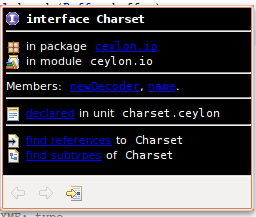
Code popup
Ctrl-P, or "Show Code" pops up an information control containing
the code of the referenced declaration. Ctrl-P again opens an
editor. Hyperlink navigation from the Code popup is also possible.
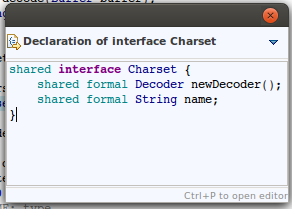
Hierarchy and Outline popups
As before, Ctrl-T and Ctrl-O open the popup Hierarchy and
Outline views. These now look a lot prettier, and they are also more
functional. You can filter the contents by typing inside them, and
they remember their bounds. The Hierarchy View is also much better
integrated with Java stuff. Ctrl-T inside the open Hierarchy View
cycles between Hierarchy View, Supertypes View, and Subtypes
View. These popups have configurable background colors.
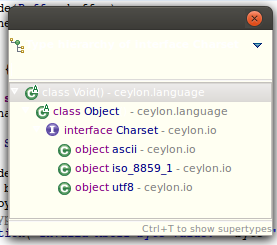
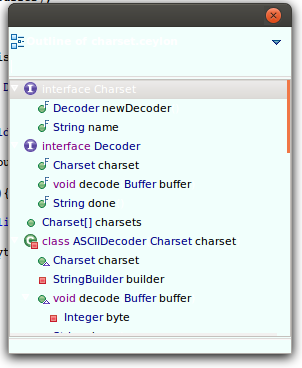
Auto-addition of needed imports
Refactorings, quick fixes, and autocompletions now add any needed imports to the top of the source file. In addition, autocompletion will propose declarations from any imported module, even if the package is not imported in the current unit.
New Quick Fixes/Assists
Thanks to Sjur and Tomáš, we now have some new quick fixes and assists:
- convert if/else to then/else, then/else to if/else
- invert if/else
- add type constraint to type parameter
Clean Imports
Clean Imports now automatically fills in missing imports if unambiguous, and prompts the user to choose a declaration to import if ambiguous.
Terminate Statement
Ctrl-2 adds any necessary semicolon, closing parens, and closing
braces to terminate the statement at the current line. This feature is
almost magical in how good it is at guessing where the closing
punctuation needs to go.
Mark occurrences
Occurrence marking is now enabled by default and works like JDT (the declaration to highlight is the one under the caret).

Proposals popups
Completions proposals and quick fix/assist proposal popups now have syntax highlighting. Typing a "." automatically activates the completion proposal window. When only one completion proposal is available, it is automatically applied.

Select Enclosing/Restore Previous Selection
Ctrl-shift-up expands the selection to the containing expression or
program element. Ctrl-shift-down takes you back to the previous
selection.
Also Ctrl-Shift-P takes you to the matching bracket and Show In now works.

Outline View
There is now a popup context menu on Outline View nodes. The selected node now follows the editor caret location.
Tomáš added a toolbar to the Outline View, letting you filter out local declarations and expand/collapse all nodes.
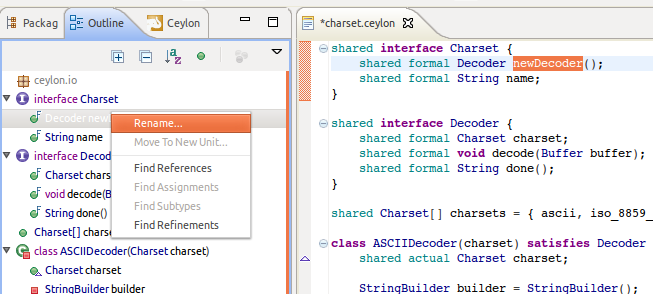
Open Ceylon Declaration / Open Type
The default keyboard binding for Open Ceylon Declaration is now
Ctrl-Shift-O instead of Ctrl-Shift-C. This is more ergonomic and
works even inside the Java editor. Inside the Ceylon perspective,
Ctrl-Shift-T opens the Open Type dialog, which lets you choose
between Ceylon and Java types in one dialog (a very slow-to-load
dialog, but hey...).
F3 (Open Selected Declaration) now handles Java declarations.
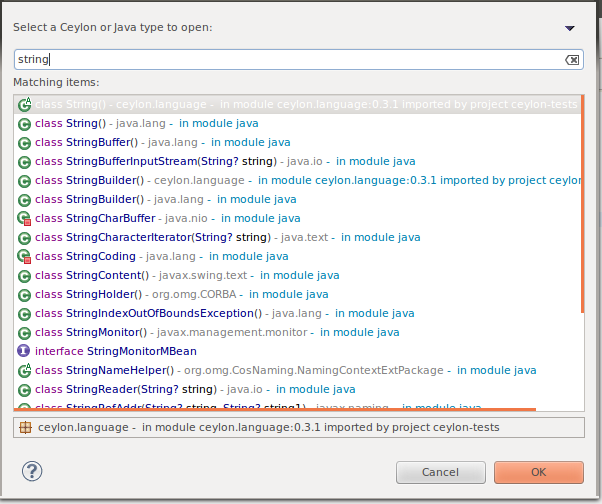
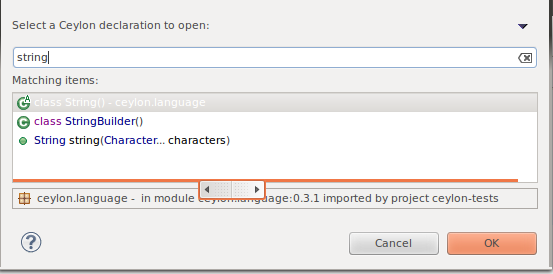
Support for multiple module repositories
The New Project wizard and Ceylon Preferences page now let you configure multiple module repositories for a project.

Backend errors
Errors from the compiler backend now show up in the Problems View and vertical ruler, and compiler progress is visible in the Progress View and status bar. The 80s-style scrolling console is gone.
Progress
Building the completion proposals and hierarchy for the first time is now expensive because it involves trawling the whole JDK. You get a nice progress bar in the status bar of the main window.
Parser lifecycle
Code is lexed/parsed synchronously on every keypress, and lexed/parsed+typechecked synchronously on every keypress when the completions proposals window is open. This results in much more responsive syntax highlighting and fixes some wierd behavior in the completion proposals window. When the completions proposal window is not open, typechecking still happens in a background job as before.
Download it today
The Ceylon IDE is available today from our update site or from Eclipse Marketplace:

|
Ceylon IDE | Eclipse Indigo | drag and drop into a running Eclipse workspace |
After installing, go to Help > Welcome to Ceylon to get started.
